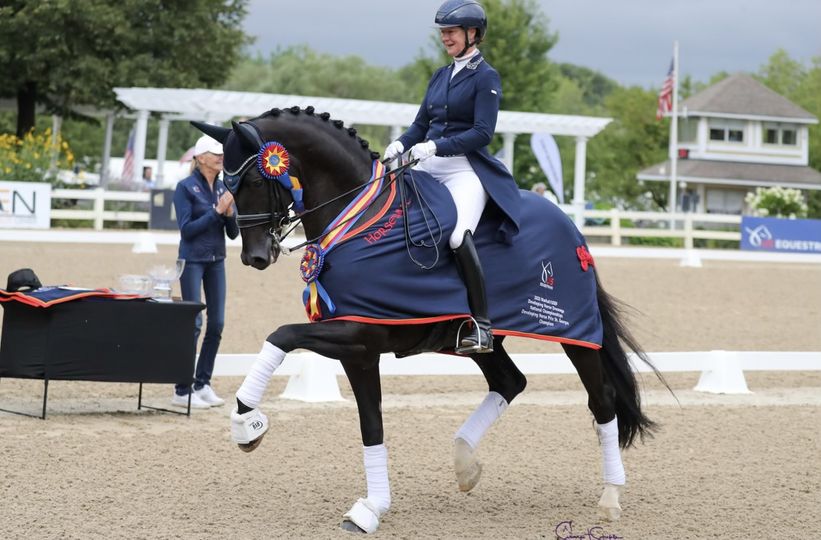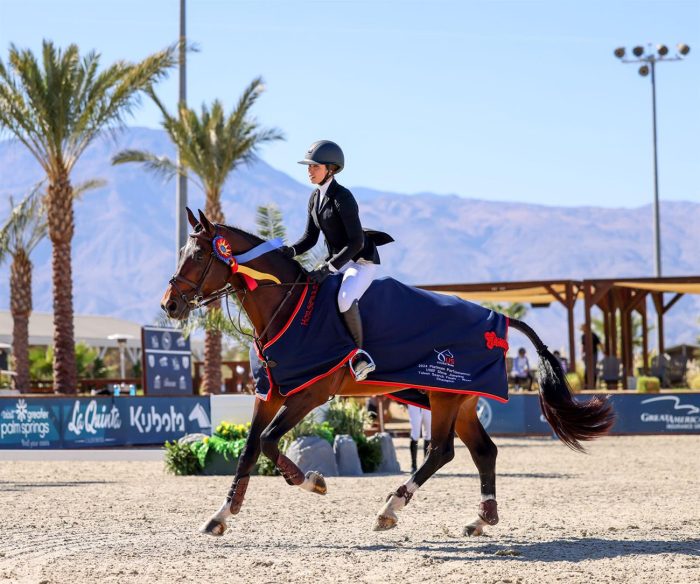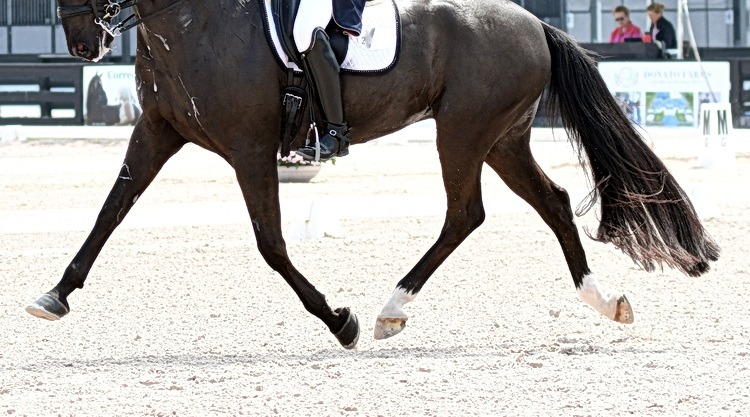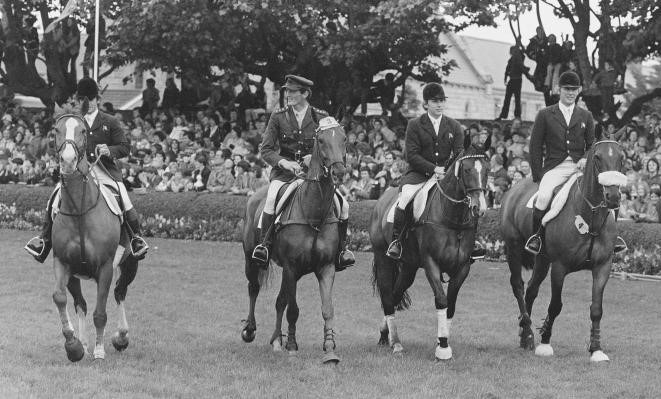by Nancy Jaffer | Nov 19, 2024
The Rancho Mission Viejo Riding Park is ready to host California horse shows in the new year after the Ridland Group completed a state-of-the-art plan to capture stormwater originating from its facility in San Juan Capistrano, according to a joint statement from that entity and the Orange County Coastkeeper organization.
The new infrastructure will keep contaminated storm water out of San Juan Creek, an important waterway that supports aquatic habitat and flows into Doheny State Beach. The plan resolves Orange County Coastkeeper’s concerns and cements the two groups’ alliance in support of clean water.
“We extend our sincere congratulations to the Ridland Group for completing this project ahead of schedule,” said Garry Brown, founder and president of Orange County Coastkeeper.
“We are excited to observe the new system during the upcoming rainy season and are confident in its success.”
Coastkeeper hopes the stormwater capture system can serve as a national model, proving that large-scale equestrian centers can be effective watershed stewards.
“This is a huge stride forward for the equestrian community,” said Hillary Ridland, CEO of the Ridland Group.
“With this accomplished, we can get started on all of the upgrades we have planned for the park. We thank Coastkeeper for its cooperation as we found our way to the finish line.”
In May, the U.S. Equestrian Federation reorganized major shows on the Southern California spring/summer calendar in the wake of Coastkeeper’s decision earlier in the month to bar any equestrian activities involving more than 25 horses from the Riding Park.
The indefinite closure was due to failure of the Ridland Group to comply with requirements and commitments made under a 2018 consent decree involving water quality, according to USEF. The Ridland Group also is run by Hillary’s husband, USEF show jumping chef d’equipe Robert Ridland.
According to a posting by the City of San Juan Capistrano, it entered the 2018 consent decree with Coastkeeper and the Ridland Group to resolve litigation arising from alleged water quality violations at the city’s Riding Park property. It required completion of three water quality projects by April 15, 2024, several of which were done by the city.
When the work was not completed, a competition application process for the Riding Park’s dates was begun for organizers who met USEF standards, license criteria and had a venue. There were 21 applications submitted, including by the Ridland Group, for the period from June into September.
The city, the Ridland Group and Coastkeeper reached agreement in mid-May on an amendment to the consent decree that extended the Ridland Group’s project completion timeline, allowing equestrian events at the venue. Blenheim Equisports kept five of its 10 shows at the Riding Park.Two Blenheim shows also were held at the Los Angeles Equestrian Center.
Some show calendar decisions for California in 2025 are pending.

by Nancy Jaffer | Nov 20, 2024
Sabine Schut-Kery, the highest-scoring rider on the 2021 Olympic silver medal team, has received the U.S. Dressage Foundation’s $25,000 Carol Lavell Advanced Dressage Prize.
Sabine will use the money for training Sonnenberg’s Jersey, a 10-year-old Dutch warmblood stallion owned by Gina and Dan Ruediger and bred by M.A. Van de Goor in the Netherlands.
At the 2024 U.S. Dressage Festival of Champions this year, Sabine and Jersey were Intermediate 1 champions. Sabine will use the prize for intensive training with Christine Traurig, who also was chef d’equipe of the 2024 U.S. Olympic team.. Sabine will take video lessons with her German-based trainer, Jan Nivelle, and ride in clinics with Lilo Fore, who has judged dressae at the highest level.
“I am beyond excited and grateful to receive this year’s Carol Lavell Advanced Dressage Prize for Sonnenberg’s Jersey,” said Sabine.
“This generous prize from the Dressage Foundation will give me more concentrated training to help me develop Jersey toward Grand Prix. Without this grant, our education would be limited, and we could not receive the training needed to reach the highest levels of the sport. I am extremely excited about Jersey’s potential and our future together.”

Sabine Schut-Kery and Jersey. (Susan J. Stickle Photo)
She continued, “I can’t thank TDF enough for the commitment, support, and passion for dressage in the USA and I would also like to take the opportunity to thank Jersey’s owners, Gina and Dan Ruediger, my coach Christine Traurig, and my close team for believing in us and supporting this partnershi. I will work very hard and hope we will make you proud.”

by Nancy Jaffer | Nov 11, 2024
Like the victors in the other major equitation championships this fall, the winner of the Platinum Performance/ USEF Show Jumping Talent Search West has parents who are professionals.
Avery Glynn, the daughter of Hope Glynn and Ned Glynn, took the title last weekend at the Desert International Horse Park in California, more than a month after Taylor Cawley won the East version at the U.S. Equestrian Team Foundation in Gladstone, N.J.
A member of the equestrian team at Auburn University in Alabama, Avery borrowed Change Up PS from David Bustillos for the class when she flew home to the West Coast.

Avery Glynn and Change Up PS (Photo by Avery Wallace)
“He has just been the most incredible partner,” she said of her mount, an OIdenburg stallion.
“So scopey, a big stride, brave—I’m just so lucky to have been able to show him.”
Judges Kirsten Coe and Michael Tokaruk designed a version of the Paris Olympic course to test the 26 riders who participated. Paige Walkenbach, who won the flat phase, finished second, followed by Victoria Zahorik and Katherine Reuter.

by Nancy Jaffer | Nov 10, 2024
Not too far down the road, your dressage test likely will be judged to some extent by Artificial Intelligence (AI), as well as a human official. And you probably can expect AI to be used to a certain degree in horse inspections at competitions in the future.
That was part of the discussion during a press conference following a closed-door gathering last week in the Netherlands of the International Dressage Riders Club, the International Dressage Trainers Club and the Dressage Organizers and Officials organization.
So how should AI be used in judging dressage? The most obvious answer is for items such as keeping track of the number of lead changes, regularity of paces or how many times a horse performs a pirouette.
“There are a lot of possibilities,” said Klaus Roeser, secretary-general of the IDRC, noting riders and trainers are quite interested but the judges “are a little bit scared about it. They may think, `Maybe in five years, they don’t need us anymore.’ ”
But Klaus said, “That’s totally not the point,” explaining AI may reduce the complexity of the judging task, so the officials “can concentrate more on the quality. Because quality you can’t measure with AI.”
In the near future, the use of AI will be tested, and judges are open to the idea, according to Klaus. It was pointed out that use of AI may help spectators understand the sport better.
As dressage reacts to being under pressure after several well-publicized, high-profile horse abuse cases in the past year, more than 120 stakeholders of the sport at the meeting discussed that situation and others that can impact the future of dressage, particularly its inclusion in the Olympic and Paralympic Games.
Suggestions gleaned from the gathering on a look at the state of the sport went to Ronan Murphy, the FEI’s director of dressage, who is developing a new strategy for the discipline.
Issues center around perception, welfare, transparency and trust, items that need to be addressed in order to improve the situation, said Linda Keenan, secretary-general of the IDTC. Linda said “specific things” will be done “to gain more trust,” but until Ronan is ready to reveal them, no more can be said.
Klaus suggested that having open stable days so people can see how the horses are taken care of, could be a helpful approach, but he added, “it will never prevent if you have boys or girls doing bad things behind closed doors.”
Linda mentioned that riding that is not good enough can be conflated to become a welfare issue, when it’s simply “not fulfilling the goals to get a high score.” She also noted, “just because you’re not doing something perfectly is not the same as being abusive. We really need to do a better job of clarifying what is abuse and what isn’t abuse.”
Organizers addressed the difficulties they are having putting on CDIs and the financial pressures that exist in connection with that. At its general assembly this week, the FEI will address cutting the number of judges officiating at a World Cup Final from seven to five for cost-saving reasons.
The Dutch and Swedish federations made a proposal to allow use of a snaffle, instead of a double bridle, at Grand Prix in international competitions. It will not be voted on at this year’s general assembly, but Linda said it seems the FEI wants to encourage organizers to offer restricted classes where the snaffle is used, though such classes could not be Olympic qualifiers.
She noted the double bridle is not a welfare issue. Linda added a recent study showed there are more mouth lesions with snaffles. Riding with a double bridle is a skill; “it’s one of the ultimate skills of dressage riding. Competitors need to prove their competence at the top level in terms of using a double bridle.”
Other items discussed at the meeting included the effect that shape and fitting of the bit and bridle have on horse performance, the effect of saddle design on performance and the rider’s seat and the impending device for testing the tightness of a noseband, which is not yet available, so it’s not possible to give a recommendation on how to deal with it, Linda said.

by Nancy Jaffer | Nov 5, 2024
Kent Farrington and McLain Ward will represent the U.S. next month in Geneva at that most elite of elite match-ups, the International Jumping Riders Club’s competition for the world’s top 10.
Here is the complete list of participants: World Number One Henrik von Eckermann (Sweden), current titleholder Steve Guerdat going for the title for the fourth time, former Olympic champion Ben Maher (Great Britain), Kent at number four; Julien Epaillard (France), Max Kuhner (Austria), Richard Vogel (Germany), Olympic champion Christian Kukuk (Germany) McLain and Ireland’s Conor Swail.

Kent is at the far left on the second row; McLain is second from right in the first row.
Meanwhile, the U.S. has qualified as one of 10 nations that will compete for the second season of the Longines League of Nations. The U.S.earned the third-most points, behind Ireland and France and ahead of Olympic champion Great Britain. At the bottom of the rankings, Brazil was replaced by Italy in tenth and Canada was close, eleventh, but did not make the cut.
The U.S. leg of the League is held during March at the World Equestrian Center in Ocala.

by Nancy Jaffer | Nov 5, 2024
A legendary rider of the 1970s and ’80s, Capt. Con Power of Ireland, has passed away at age 71 after a long illness.
A mainstay of the Irish team during his era, Capt. Power was part of his nation’s three straight victories in the country’s most important competition, the Aga Khan Cup at the Royal Dublin Horse Show, in 1978, 1979 and 1980. He was leading rider at Dublin in 1976 and 1979 and took the same award at Washington, New York and Toronto in 1978. Capt. Power won five classes at Aachen in 1979,
The horses he rode included Coolronan, Castlepark and Rockbarton. Another of his mounts, Mullacrew, became the dam of influential Irish sporthorse sire, Cruising.

The legendary Irish Aga Khan team of Paul Darragh, Con Power, James Kiernan and Eddie Macken.
Although he started his career as a jockey, growing to 6-feet, 2-inches tall called for a change of focus. Beginning in the Army Equitation School in 1973 on a six-week trial, he was selected to stay. In 1979, he retired from the Irish Defense Forces and set up his own equestrian business. The former officer was Irish Show Jumping Rider of the Year from 1983-1986.
Irish Horse Board Chairman Tiernan Gill pointed out that “Capt. Con Power really was one of Ireland’s true horsemen, with sporting achievements in so many different aspects of the industry, coaching, racing, eventing and showjumping.
“To be part of the famous three-in-a-row Aga Khan winning team on three different Irish-bred horses, demonstrates the phenomenal talent that he had with different types of horses. Winning a puissance competition before riding on a winning Nations Cup team at the same show, on the same horse, is a something that will probably never be repeated.”
Capt. Power is survived by his wife, Margaret, and their children, Robbie, a former jockey and Elizabeth, an eventer.








